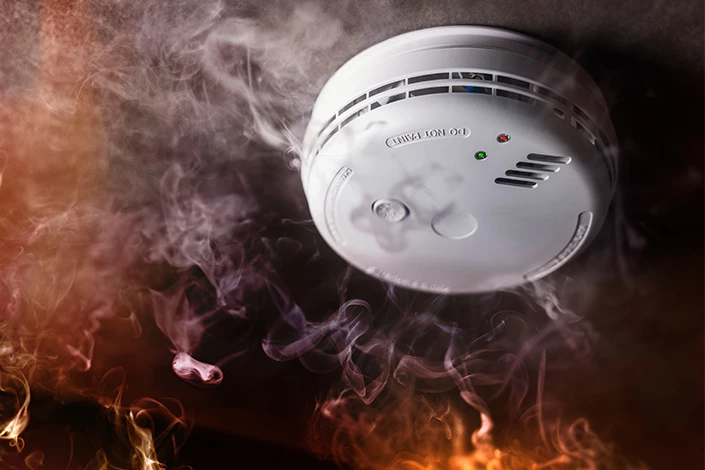Smoke Detector Laws in New Mexico
Mar 08, 2023
Nearly two-thirds of home fire-related deaths occur in homes without working smoke alarms, according to the National Fire Protection Association. Smoke alarms are essential in both homes and commercial buildings to alert people of potentially dangerous smoke and fires. They give people time to evacuate and contact emergency services before the fires cause devastating damage.

While many people voluntarily install smoke detectors in their houses and commercial buildings, you may also be legally required to do so. Different states have different fire safety and smoke alarm regulations, and it’s important to familiarize yourself with the smoke alarm laws in your state.
This article will serve as a guide to New Mexico smoke detector requirements.
Smoke Alarm Requirements Based on Property Type
Typically, states have different smoke detector laws for different types of properties. Here’s how New Mexico’s smoke detector regulations differ for residential and commercial buildings:
For Residential Dwellings
All residential dwellings in New Mexico must have smoke alarms installed. This includes single and multifamily homes, rental properties, live-in care facilities, and hotels. The owners of a personal residential dwelling unit have more flexibility with where to install these smoke alarms.
In residential health facilities with four or more residents, you must install smoke alarms on each floor and ensure the alarm is audible in all of the sleeping areas. The law also requires smoke alarms in assembly areas like living rooms and dining rooms. If one of these facilities has bedrooms on the second floor and common areas on the first floor, for example, the owner would need to install alarms on both the upper level and the lower level.
Lower levels that are habitable, such as basement bedrooms and multi-purpose rooms, must also have smoke alarms.
For Commercial Buildings
Different municipalities within New Mexico have their own smoke alarm requirements for commercial buildings. Generally, commercial buildings must have up-to-date smoke alarms installed to protect the people who work and shop there.
Types of Smoke Alarms and Battery Requirements
Smoke alarms are only effective as long as they are operational. It's therefore important for individuals and regulators to consider both the smoke alarms and their batteries when determining the best smoke detectors for a building.
Smoke alarms powered by replaceable batteries used to be a very popular choice in homes. They were powered by AA batteries, AAA batteries, or 9V batteries that needed to be replaced at least once annually. 10-year battery alarms have also gained popularity. These alarms come with a sealed, non-replaceable battery meant to last up to 10 years.
However, smoke detector laws in New Mexico have specific requirements for both the smoke alarm and its batteries. In older buildings, property owners can choose their preferred smoke alarm type. Many older buildings will have the two smoke detector types listed above. In newly constructed or renovated buildings, however, homeowners must install hard-wired smoke alarms with battery backups.
Hardwired smoke detectors with battery backups are hardwired into the property’s electrical system but also have a secondary battery backup in case the electrical system fails. This battery may either be replaceable or a 10-year sealed battery.
The Responsibility of Property Owners
Property owners have a legal responsibility to protect people who visit their property from known dangers by exercising reasonable care and maintenance. For fire protection, property owners are responsible for the installation and replacement of smoke alarms on their properties. In some cases, the property owner may also be responsible for the maintenance of smoke detectors.
If you are injured in a fire- or carbon monoxide-related event, the property owner may be liable. A qualified personal injury attorney can help you determine if the property owner performed the property due diligence, such as running regular tests on smoke detectors and carbon monoxide detectors, and whether they are responsible for your injuries.
What Is the Penalty for Non-Compliance?
Non-compliance with smoke detector laws in New Mexico can result in fines. These fines add up if properties continue to be out of compliance, so it’s important that property owners meet New Mexico standards as quickly as possible.
More importantly, if a property does not meet the standards for smoke alarms or carbon monoxide alarm systems and you are injured as a result, the property owner may be liable for your injuries. This means they may be required to pay compensation for your medical bills, legal fees, and other expenses as a result of your injury.
Are Carbon Monoxide Alarm Systems Required in New Mexico?
In addition to smoke alarms, carbon monoxide alarm systems are also required in New Mexico. All newly constructed one- and two-family dwellings, as well as townhomes under three stories, must have carbon monoxide alarms.
Carbon monoxide (CO) alarms warn you about unusual, dangerous build-up of CO in a building. If these alarms go off, everyone in the building should evacuate as soon as possible to avoid carbon monoxide poisoning.
Carbon monoxide poisoning occurs when inhaled CO builds up in a person’s bloodstream, replacing the oxygen and starving critical organs, like the heart and brain, of the oxygen they need to function properly.
Eventually, CO poisoning can cause unconsciousness and even loss of life. Common early symptoms of carbon monoxide poisoning include vomiting, confusion, dizziness, chest pain, and weakness. More than 400 Americans die each year from unintentional CO poisoning, and another 100,000 have to visit the emergency room. People who suffer injuries from carbon monoxide poisoning can file a lawsuit to receive compensation.
According to the Environmental Protection Agency, property owners should install carbon monoxide detectors in the hallways near each sleeping area in a house. They should also read all instructions and warnings included with their CO alarms.
If You've Suffered From Carbon Monoxide Poisoning, Contact Us Today
Carbon monoxide poisoning can be devastating. It can lead to expensive medical bills, short- and long-term health conditions, and even death. If you or someone you love has suffered from carbon monoxide poisoning, experienced personal injury law attorneys can help you get the compensation you deserve.
At the Spence Law Firm, our qualified attorneys specialize in helping people like you through the process of filing a personal injury lawsuit. Contact us today for a free consultation about your case.

Meet with us.
If you are struggling with a serious injury, or are fighting against seemingly impossible odds against big corporations, insurance companies or the government, call us to speak with our team of trial lawyers who will fight for you. We take no fee unless we earn it by winning your case.